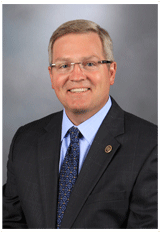JEFFERSON CITY — Throughout the years, the General Assembly has provided ways for our state’s students to achieve the goal of post-secondary education. One goal that our state has set is to have 60 percent of our state’s population obtain a higher education degree or certificate by the year 2024. An initiative used in other states to assist higher education students is a State Authorization Reciprocity Agreement, or SARA. The idea is that states would allow students to utilize out-of-state online education at the in-state price. And, just this week in the Missouri Senate, Senate Bill 492, dealing with performance funding for higher education, passed the Senate with a vote of 33-0.
For those community colleges, the Coordinating Board of Higher Education is in the process of creating a statewide core transfer library of no less than 25 courses that would transfer between every public college or university to facilitate the ease of student transfers between schools. Just last week, the board released a list of courses that are transferable. These include American Government, American History I, American History II, Anthropology, Art Appreciation, Astronomy, Calculus I, Drawing I, Introduction to Statistics, Music Appreciation, Oral Communication, Philosophy, Psychology, Public Speaking, Western Civilization and World Religions. These 16 new courses join the four that are already in place, Micro-and Macroeconomics, College Algebra and Sociology.
There are a number of reasons why students transfer schools during their higher education careers. Prior to the transfer library, it was often up in the air if credits transferred between schools, and many general education requirements didn’t transfer. Students were then left with unnecessary credit hours and higher possible student debt.
HB 1042 also called for the development of a reverse transfer policy, allowing any student who began their degree search at a two-year school, but transferred to a four-year institution, to return to obtain an associate’s degree if they have earned enough credits at the four-year institution. In order to facilitate this, MDHE has launched the Missouri Reverse Transfer Initiative. Built on existing agreements with both public and independent two- and four-year institutions, MDHE has developed this reverse transfer policy. The committee charged with this task is made up of representatives from 18 higher education institutions. For more information on the Coordinating Board for Higher Education and its continuing efforts to assist higher education students in Missouri, please visit www.dhe.mo.gov/cbhe.
Missouri should be a front-runner in higher education, with an educated workforce to draw and keep employers to our state. We are well on our way to accomplishing that goal. With programs like the core transfer library, reverse transfers and Innovation Campuses created by our state last year, the opportunities are available for Missouri students to become Missouri degree-holders and employees of fine Missouri-based businesses.
As always, please feel free to contact me or my staff with any questions or concerns at any time. We look forward to hearing your comments and suggestions and trying to answer any questions you may have. You can reach us by phone at 866-277-0882 (toll-free) or 573-751-2272, or by fax at 573-526-7381. |



